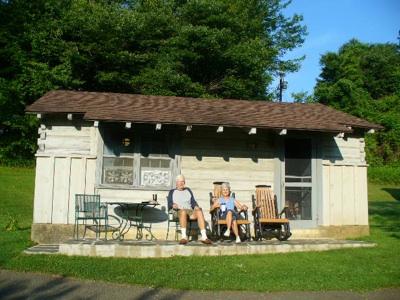Editor's note: As our lodging experts, David and Kay Scott, continue on their 2010 odyssey across the National Park System, they get to sample some of the best lodging, food, and coffee there is to be had. This dispatch came from the Rocky Knob Cabins along the Blue Ridge Parkway.
Wednesday entailed a short drive of 75 miles along the Blue Ridge Parkway on a day of clouds, mist, and fog. Even in this weather the parkway is an enjoyable drive, especially compared to interstates with speeding vehicles and pesky 18-wheelers.
We left Bluffs Lodge late in the morning and arrived at Rocky Knob Cabins about 4:00 in the afternoon. In between we visited the small town of Sparta, N.C., to buy some gasoline and nose around town. We visited the Chamber of Commerce and discovered a store brimming with handicrafts of local artisans. The color pencil drawings and leatherwork were outstanding. One of Sparta’s main manufacturing facilities is Dr. Grabow’s Pipes (the kind you smoke), but the company's operation now seems a shell of what it must have once been.
On the parkway we visited the Blue Ridge Music Center (milepost 213), a relatively new facility that is managed under a cooperative agreement between the National Park Service and the National Council for the Traditional Arts. This region of the Blue Ridge is a hotbed for folk music and the center’s objective is to honor and preserve the musical traditions of the Blue Ridge. Each August nearby Galax hosts the world’s oldest and largest fiddler’s convention. The music center has an impressive outdoor amphitheater, an indoor auditorium, and exhibits. Local musicians can often be found performing in the breezeway of the visitor center.
Mabry Mill (milepost 176) is a major attraction, and considered the most-photographed location on the Blue Ridge Parkway. Like parkway traffic, visitation was relatively light during our stop since this is early in the season. In the Mabry Mill store, adjacent to the famous grist mill, we talked with gift shop manager Bertha Cesaro, who showed us the store's regional handicrafts, including goat's milk soap and jewelry. The store also stocks such local food items as jams, nuts, fudge, and cider. Bertha has been at this location for 21 years and has developed a feel for what her customers are likely to buy. (Note to the suits at Forever Resorts in Scottsdale: Bertha is certain she can sell lots of throws that include a Mabry Mill rendering. We think you should move on this.)
The rear of the store has a small restaurant best known for its buckwheat pancakes. The restaurant also offers sweet potato pancakes, country ham, and some terrific biscuits with a side of jam. Breakfast items are sold all day at the restaurant.
A couple of miles north on the parkway was our stop for the night. In the world of national park lodges, Rocky Knob Cabins is in a class by itself. The entire complex consists of seven rustic cabins, two of which are constructed as duplex units. The cabins are tucked away in a small hollow in the middle of a hardwood forest. If you want to experience Appalachia, this is the promised land.
The cabins were constructed in the late-1930s or early 1940s (nobody seems to know for sure) by the Civilian Conservation Corps. The buildings sit in a semi-circle around the community bathroom (separate units for men and women) that has showers, sinks, and toilets. The cabins are quite roomy and each has two double beds (the handicap-accessible cabin has one double bed) and a kitchen with a full-size refrigerator, stove top, sink, and cold water. Dishes, utensils, and pots and pans are provided. One handicap-accessible cabin has its own bathroom and hot water.
Solitude and nature are in abundance here. There are no TVs or planned activities, so bring a book, a deck of cards, or some games and enjoy the real outdoors. Like Bluffs Lodge, you are likely to strike up a conversation with your neighbors. An interesting church and small cemetery are a short hike up the road. Other trails are nearby. Cabins at Rocky Knob are $65 per night.
On Thursday we headed north to Peaks of Otter Lodge, the northern-most lodge on the Blue Ridge Parkway. Before that, though, we headed back to Mabry Mill for a breakfast of buckwheat pancakes.
David and Kay Scott are regular contributors to the Traveler. Their book, The Complete Guide to the National Park Lodges was first published by the Globe Pequot Press in 1997 and is now in its sixth edition.


 Support Essential Coverage of Essential Places
Support Essential Coverage of Essential Places







Comments
Stayed at these wonderful cabins when our son was born. He's now 40 years old and they look to be exactly the same. Rustic and quiet, just the way we like it.